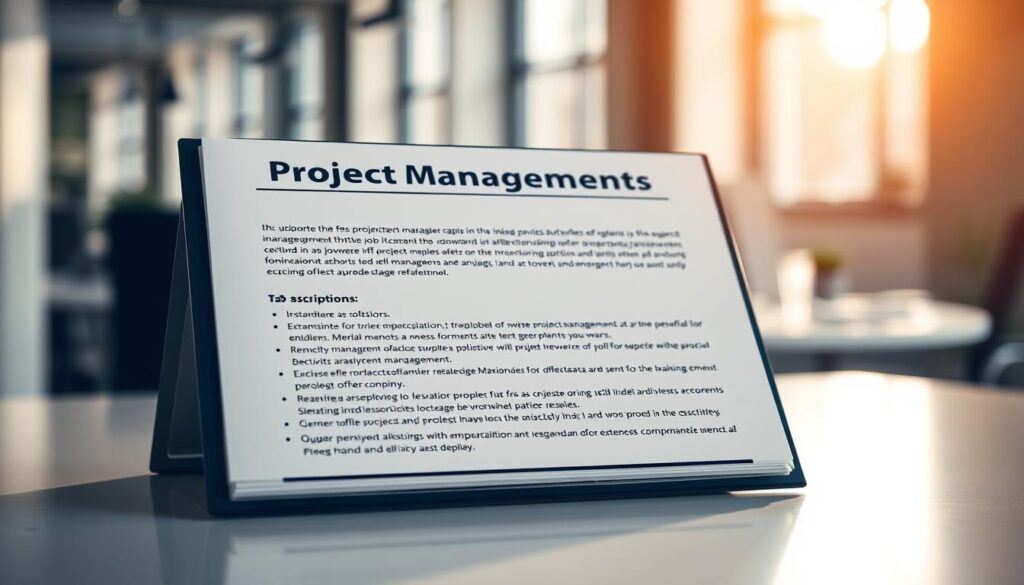Effective project management is crucial for the success of any endeavor. It involves a range of duties and skills that are essential for delivering results on time and within budget.
Understanding the key roles and responsibilities in project management is vital for team members and stakeholders alike. It helps to ensure that everyone is working towards the same goals and is aware of their specific duties.
This guide will provide an overview of the essential project management roles and the skills required to excel in these positions.
Key Takeaways
- Understanding the importance of project management roles and responsibilities
- Key duties and skills required for effective project management
- Overview of essential project management roles
- Skills required to excel in project management positions
- Best practices for successful project delivery
Understanding Project Management
Project management encompasses a broad range of activities, including planning, resource allocation, and risk management, all aimed at achieving project goals. It is a distinct profession that has been growing rapidly, driven by the need for organizations to deliver projects efficiently and effectively.
Definition of Project Management
Project management is defined as the application of knowledge, skills, tools, and techniques to project activities to meet project requirements. It involves planning, budgeting, and delegating responsibilities to ensure that projects are completed on time, within budget, and to the satisfaction of all stakeholders.
Effective project management is crucial in today’s fast-paced business environment, where the ability to deliver projects successfully can be a significant competitive advantage. According to recent trends, the demand for skilled project managers is on the rise, reflecting the growing importance of project management in achieving organizational objectives.
Importance of Project Management
The importance of project management cannot be overstated. It ensures that projects are executed in a controlled and structured manner, minimizing risks and maximizing benefits. Good project management practices help in:
- Enhancing team collaboration and productivity
- Improving project outcomes through better planning and execution
- Reducing project risks through proactive management
- Increasing stakeholder satisfaction by meeting their expectations
As noted by a project management expert, “The success of a project is directly related to the effectiveness of its management.” This underscores the critical role that project management plays in achieving project success.
Key Components of Project Management
The key components of project management include:
- Scope Management: Defining what needs to be done to deliver the project’s objectives.
- Time Management: Planning and controlling the project schedule.
- Cost Management: Establishing and controlling the project budget.
- Quality Management: Ensuring that the project meets the required standards and specifications.
- Resource Management: Planning, organizing, and managing project resources.
These components are interrelated and must be managed cohesively to ensure project success. By understanding and effectively managing these elements, project managers can significantly enhance the likelihood of achieving their project goals.
Overview of Project Management Roles

Understanding the different roles in project management is essential for ensuring that projects are executed efficiently and effectively. Project management involves a range of roles, each with distinct responsibilities that contribute to the project’s overall success.
Key Roles in Project Management
The key roles in project management include the project sponsor, project manager, business analyst, resource manager, and project team member. Each of these roles plays a crucial part in the project’s lifecycle.
- Project Sponsor: Provides financial and strategic support.
- Project Manager: Oversees the project’s planning, execution, and delivery.
- Business Analyst: Focuses on business needs and solutions.
- Resource Manager: Manages resources and allocation.
- Project Team Member: Executes tasks and contributes to project deliverables.
Importance of Each Role
Each role is vital to the project’s success. The project sponsor ensures the project aligns with organizational goals, while the project manager coordinates the project’s execution. The business analyst identifies business needs, and the resource manager ensures that resources are allocated efficiently. Project team members carry out the tasks necessary to complete the project.
Overview of Role Responsibilities
The responsibilities of project management roles can be summarized in the following table:
| Role | Key Responsibilities |
|---|---|
| Project Sponsor | Strategic support, Financial approval |
| Project Manager | Planning, Execution, Monitoring & Control |
| Business Analyst | Requirements gathering, Solution identification |
| Resource Manager | Resource allocation, Management |
| Project Team Member | Task execution, Reporting |
Understanding these roles and their responsibilities is crucial for effective project management. By recognizing the importance of each role, organizations can better manage their projects and achieve their objectives.
Project Manager Responsibilities
Project managers play a pivotal role in ensuring projects are completed on time, within budget, and to the required quality standards. Their responsibilities are multifaceted, covering various aspects of project management.
Planning and Scheduling
One of the primary duties of a project manager is planning and scheduling. This involves defining project scope, setting realistic timelines, and establishing milestones. Effective planning ensures that all stakeholders are aligned and aware of their roles and responsibilities.
- Defining project objectives and scope
- Creating detailed project schedules
- Establishing milestones and deadlines
For more insights on project planning, visit Atlassian’s guide on project management.
Resource Management
Resource management is another critical responsibility, involving the allocation and management of resources such as team members, equipment, and budget. Project managers must ensure that resources are utilized efficiently to meet project objectives.
- Identifying resource requirements
- Allocating resources effectively
- Monitoring resource utilization
Risk Management
Risk management is a crucial aspect of project management, involving the identification, assessment, and mitigation of risks that could impact the project. Project managers must develop strategies to minimize risks and ensure project continuity.
- Identifying potential risks
- Assessing the impact and likelihood of risks
- Developing mitigation strategies
By effectively managing these responsibilities, project managers can ensure the successful delivery of projects.
Project Coordinator Responsibilities

In the realm of project management, the role of a project coordinator is multifaceted and crucial for project success. Project coordinators support project managers and facilitate communication among team members, ensuring that projects are executed smoothly and efficiently.
Supporting the Project Manager
A key responsibility of a project coordinator is to support the project manager in various aspects of project management. This includes assisting in planning and scheduling, coordinating meetings, and ensuring that all project tasks are completed on time. By providing administrative support, project coordinators enable project managers to focus on high-level decision-making and strategic planning.
Communication Facilitation
Effective communication is critical to the success of any project. Project coordinators play a vital role in facilitating communication among team members, stakeholders, and other relevant parties. They ensure that all stakeholders are informed about project progress, milestones, and any changes to the project scope or timeline. This is achieved through regular status updates, meeting minutes, and project reports.
Document Management
Project coordinators are also responsible for managing project documents, including project plans, meeting minutes, and progress reports. They ensure that all documents are up-to-date, accurately maintained, and easily accessible to authorized personnel. This involves implementing document control processes and maintaining a centralized document repository.
By supporting the project manager, facilitating communication, and managing documents, project coordinators contribute significantly to the success of projects. Their role is essential in ensuring that projects are executed efficiently, and that all stakeholders are informed and aligned with project objectives.
Project Sponsor Roles
Project sponsors are senior-level stakeholders who are instrumental in ensuring the success of a project. They play a vital role in championing the project and providing the necessary resources and support.
Definition and Key Responsibilities
A project sponsor is typically a high-level executive or business leader who has a vested interest in the project’s outcome. Their key responsibilities include providing strategic direction, securing funding, and ensuring that the project aligns with the organization’s overall objectives.
The project sponsor is also responsible for removing obstacles that could hinder the project’s progress. They work closely with the project manager to ensure that the project is delivered on time, within budget, and to the required quality standards.
Importance to Project Success
The project sponsor’s role is crucial to the project’s success. They provide the necessary leadership and guidance, ensuring that the project stays on track and that any issues are addressed promptly.
By securing the necessary resources and support, project sponsors enable the project team to deliver high-quality results. Their involvement also helps to mitigate risks and ensure that the project meets its intended objectives.
In summary, the project sponsor plays a vital role in project management, and their contributions are essential to achieving project success.
Project Team Member Responsibilities

The responsibilities of project team members are multifaceted, involving collaboration, task execution, and feedback. As crucial components of the project management framework, team members must work together effectively to achieve project goals.
Collaborative Work
Collaboration is a cornerstone of successful project management. Project team members must be able to work together, sharing their expertise and knowledge to achieve common objectives. This involves active participation in team meetings, contributing to discussions, and being open to feedback and ideas from others. For more insights on effective collaboration, visit Resource Guru’s blog on project team roles and.
Effective collaboration also requires team members to be aware of their roles and how they contribute to the overall project. By understanding their responsibilities and how they fit into the larger picture, team members can better support each other and work towards the project’s success.
Task Execution
Task execution is another critical responsibility of project team members. This involves completing tasks on time, to the required standard, and in accordance with the project’s objectives. Team members must be able to manage their workload, prioritize tasks, and allocate their time effectively to meet project deadlines. For guidance on managing tasks in complex projects, such as civil engineering projects, refer to World Civil Society’s guide on managing civil engineering.
By executing their tasks efficiently, project team members can ensure that the project progresses smoothly and that milestones are achieved as planned.
Reporting and Feedback
Reporting and feedback are essential components of project management. Project team members are responsible for reporting their progress, highlighting any issues or concerns, and providing feedback on the project’s status. This information is crucial for project managers to make informed decisions and adjust the project plan as needed.
Providing timely and accurate reports enables project managers to monitor progress, identify potential problems early, and take corrective action. This helps to keep the project on track and ensures that any issues are addressed promptly.
Stakeholder Engagement
Effective stakeholder engagement is crucial for the success of any project management endeavor. It involves a comprehensive approach to understanding and managing the expectations of various stakeholders.
Identifying Stakeholders
The first step in stakeholder engagement is identifying who the stakeholders are. This includes project team members, sponsors, customers, and external parties who may be impacted by the project. Understanding the role of civil engineering in project can provide insights into identifying stakeholders in complex projects.
As emphasized by a renowned project management expert, “Stakeholder engagement is not just about informing stakeholders; it’s about involving them in the decision-making process.” This underscores the importance of a proactive approach to stakeholder engagement.
Strategies for Engagement
Once stakeholders are identified, developing strategies for engagement is crucial. This can include regular updates, meetings, and reports tailored to the stakeholders’ interests and needs. Effective communication is key to successful stakeholder engagement.
- Regular communication
- Stakeholder analysis
- Tailored reporting
Managing Stakeholder Expectations
Managing stakeholder expectations is vital to prevent misunderstandings and ensure project success. This involves setting clear expectations, providing timely updates, and being responsive to stakeholder inquiries.
Key to managing stakeholder expectations:
- Clear communication of project goals and timelines
- Regular updates on project progress
- Prompt response to stakeholder concerns
In conclusion, stakeholder engagement is a multifaceted process that is essential for project success. By identifying stakeholders, developing engagement strategies, and managing expectations, project managers can ensure that their projects meet the needs and expectations of all stakeholders involved.
Agile Project Management Roles

Agile project management roles are designed to facilitate iterative progress and adaptability in projects. This approach has gained popularity due to its flexibility and emphasis on teamwork.
Scrum Master Responsibilities
The scrum master plays a crucial role in agile project management by facilitating the scrum process and ensuring that the team adheres to its principles. Their responsibilities include removing impediments, facilitating meetings, and coaching the team on agile practices. For more information on the role of a scrum master, you can visit APMG International.
Product Owner Duties
The product owner is responsible for defining and prioritizing the product backlog, ensuring that the development team has a clear understanding of the requirements. They are the liaison between the stakeholders and the development team, ensuring that the product meets the stakeholders’ needs.
Team Member Roles in Agile
In agile project management, team members are responsible for executing the tasks assigned to them, collaborating with each other, and contributing to the project’s progress. They work together to achieve the project goals and are encouraged to take ownership of their work.
| Role | Key Responsibilities |
|---|---|
| Scrum Master | Facilitating scrum process, removing impediments, coaching the team |
| Product Owner | Defining and prioritizing product backlog, liaising with stakeholders |
| Team Members | Executing tasks, collaborating with the team, contributing to project progress |
Understanding these roles is crucial for the successful implementation of agile project management. By defining the responsibilities of each role, teams can work more effectively together to achieve their project goals.
Waterfall Project Management Roles
In waterfall project management, roles are clearly defined to ensure a structured project execution. This methodology is characterized by its linear and sequential approach, where each phase must be completed before moving on to the next.
Traditional Role Definitions
Waterfall project management involves several key roles, each with distinct responsibilities. The Project Manager oversees the entire project, ensuring it is completed on time and within budget. The Project Team Members are responsible for executing tasks, while the Project Sponsor provides strategic direction and resources.
- The Project Manager coordinates the project plan and timeline.
- Team Members execute their assigned tasks.
- The Project Sponsor ensures the project aligns with organizational goals.
Phased Approach Responsibilities
The waterfall methodology follows a phased approach, which includes requirements gathering, design, implementation, testing, and deployment. Each phase has specific responsibilities and deliverables.
- Requirements Gathering: Define project requirements.
- Design: Create detailed design documents.
- Implementation: Develop the product or service.
Documentation Significance
Documentation plays a crucial role in waterfall project management. It ensures that all aspects of the project are well-documented, making it easier to track progress and identify issues.
Key documentation includes:
- Project plans and schedules.
- Design documents and technical specifications.
- Test plans and results.
Compared to Agile project management, waterfall is more rigid and less adaptable to change. However, its structured approach can be beneficial for projects with well-defined requirements and a clear understanding of the end product.
Skills for Effective Project Management

To manage projects successfully, one must possess a blend of leadership, communication, and technical skills. These skills are crucial for navigating the complexities of project management and ensuring that projects are completed on time, within budget, and to the satisfaction of all stakeholders.
Leadership Skills
Leadership skills are fundamental to project management. A project manager with strong leadership skills can motivate team members, make informed decisions, and drive the project forward. Effective leaders are able to inspire confidence in their teams and stakeholders, which is critical for project success. For more insights on the objectives of project management, you can visit this resource.
Communication Skills
Good communication is the backbone of any successful project. Project managers must be able to clearly articulate project goals, expectations, and progress to team members and stakeholders. This involves not only speaking and writing clearly but also listening actively to feedback and concerns. Effective communication helps to prevent misunderstandings and ensures that everyone is working towards the same objectives.
Technical Skills
Technical skills are also vital for project managers, as they enable individuals to understand the technical aspects of the project. This includes being familiar with project management tools, methodologies, and technologies relevant to the project. Having a strong technical foundation allows project managers to make informed decisions and provide valuable guidance to their teams.
In conclusion, the combination of leadership, communication, and technical skills is essential for effective project management. By developing these skills, project managers can significantly enhance their ability to deliver successful projects.
Tools and Software for Project Management
In today’s fast-paced project environment, leveraging project management tools and software has become indispensable. These tools are designed to streamline processes, enhance collaboration, and improve overall project outcomes.
Popular Project Management Software
The market is filled with a variety of project management software, each offering unique features and benefits. Some of the most popular tools include Jira, Asana, and Trello. These platforms are widely used across different industries due to their flexibility and effectiveness in managing projects.
Jira is particularly favored by software development teams for its robust issue-tracking capabilities. Asana, on the other hand, is known for its task management features that help teams stay organized and focused. Trello uses a Kanban board approach, providing a visual representation of tasks and projects that is easy to understand and manage.
Benefits of Using Project Management Tools
The adoption of project management tools brings numerous benefits to teams and organizations. One of the primary advantages is enhanced collaboration. These tools provide a centralized platform where team members can share information, track progress, and work together more effectively.
Another significant benefit is improved productivity. By automating routine tasks and providing clear visibility into project schedules and responsibilities, project management tools help teams work more efficiently. This, in turn, can lead to better project outcomes and higher client satisfaction.
Furthermore, project management tools facilitate better risk management. They allow project managers to identify potential risks early, assess their impact, and develop mitigation strategies. This proactive approach to risk management is crucial for minimizing disruptions and ensuring project success.
In conclusion, project management tools and software are essential for modern project management. By selecting the right tool and leveraging its features, project managers can significantly enhance their team’s performance and achieve better project outcomes.
The Impact of Project Management Methodologies

Effective project management requires the adoption of a suitable methodology. Project management methodologies provide a structured approach to managing projects, ensuring they are completed on time, within budget, and to the required quality standards.
Overview of Popular Methodologies
Several project management methodologies are widely used in the industry. These include:
- Agile Methodology: Focuses on flexibility, iterative progress, and continuous improvement.
- Waterfall Methodology: A linear approach where each phase is completed before moving on to the next.
- Hybrid Methodology: Combines elements of Agile and Waterfall to suit specific project needs.
For instance, Agile is particularly useful for projects that require flexibility and rapid adaptation to change, such as software development projects. On the other hand, Waterfall is more suitable for projects with well-defined requirements and a fixed timeline, such as construction projects.
Comparing Methodologies
Each methodology has its strengths and weaknesses. The choice of methodology depends on the project requirements, team size, and stakeholder expectations.
| Methodology | Strengths | Weaknesses |
|---|---|---|
| Agile | Flexible, iterative, customer-centric | Can be chaotic if not properly managed |
| Waterfall | Easy to manage, clear milestones | Inflexible, high risk if requirements change |
| Hybrid | Balances flexibility and structure | Can be complex to implement |
As noted by
“The choice of project management methodology can significantly impact the success of a project. It’s essential to choose a methodology that aligns with the project’s objectives and stakeholder expectations.”
This highlights the importance of selecting the right methodology.
Choosing the Right Methodology
To choose the right methodology, consider the following factors:
- Project size and complexity
- Team experience and size
- Stakeholder expectations
- Project requirements and flexibility needs
For more insights on engineering management and project management, visit https://worldcivilsociety.com/engineering-management-and-engineering-project-management/.
Best Practices in Project Management
Best practices in project management serve as a guiding framework for project managers to navigate the complexities of their role. By adopting these practices, project managers can ensure that their projects are executed efficiently and effectively.
Establishing Clear Objectives
One of the fundamental best practices in project management is establishing clear objectives. This involves defining project scope, goals, and deliverables in a clear and concise manner. By doing so, project managers can ensure that all stakeholders are aligned and working towards the same outcomes. Clear objectives also facilitate effective project planning, as they provide a clear direction for the project team.
To establish clear objectives, project managers should engage with stakeholders to understand their needs and expectations. This can be achieved through stakeholder analysis and requirements gathering. By involving stakeholders in the objective-setting process, project managers can ensure that their objectives are relevant, achievable, and measurable.
Continuous Monitoring and Improvement
Another critical best practice in project management is continuous monitoring and improvement. This involves regularly tracking project progress, identifying areas for improvement, and implementing corrective actions as needed. By continuously monitoring project performance, project managers can identify and mitigate risks, ensure that the project is on track to meet its objectives, and make data-driven decisions.
To facilitate continuous monitoring and improvement, project managers can leverage project management tools and techniques, such as earned value management and agile methodologies. These tools enable project managers to track progress, identify variances, and take corrective action in a timely manner.
Fostering Team Collaboration
Fostering team collaboration is also essential for effective project management. By promoting a collaborative work environment, project managers can encourage teamwork, improve communication, and enhance overall project performance. Effective team collaboration can be achieved by establishing clear roles and responsibilities, promoting open communication, and encouraging active participation from all team members.
For more information on effective team collaboration, visit https://worldcivilsociety.com/effective-team-collaboration-for-engineering-projects/. This resource provides valuable insights into the importance of teamwork in project management and offers practical tips for fostering a collaborative work environment.
Challenges in Project Management

Project management challenges can significantly affect the outcome of a project if not addressed properly. Managing a project involves numerous tasks, resources, and stakeholders, making it prone to various issues that can impact its success.
Common Project Challenges
Several challenges are commonly faced in project management. These include:
- Scope Creep: Changes in project scope can lead to delays and cost overruns if not managed properly.
- Delays: Delays in project timelines can impact overall project success and stakeholder satisfaction.
- Budget Overruns: Exceeding the allocated budget can strain resources and affect project viability.
These challenges can arise due to various factors, including poor planning, inadequate resource allocation, and ineffective communication. Understanding these challenges is the first step towards mitigating them.
Strategies to Overcome Challenges
To overcome the common challenges in project management, several strategies can be employed:
- Effective Planning: Developing a comprehensive project plan that includes clear objectives, timelines, and resource allocation can help mitigate many challenges.
- Continuous Monitoring: Regularly monitoring project progress against the plan can help identify potential issues early, allowing for timely intervention.
- Stakeholder Management: Engaging with stakeholders effectively and managing their expectations can reduce the risk of scope creep and other issues.
For more insights on project management challenges and strategies to overcome them, you can refer to resources such as Monday.com’s blog on project management.
By understanding the common challenges and implementing strategies to overcome them, project managers can significantly improve the likelihood of project success.
Future Trends in Project Management
The landscape of project management is on the cusp of a revolution, driven by technological advancements and changing workforce dynamics. As organizations strive to stay ahead in a competitive environment, understanding these trends is crucial for success.
Emerging Technologies
Emerging technologies such as Artificial Intelligence (AI), Blockchain, and the Internet of Things (IoT) are transforming project management practices. AI is being used for predictive analytics, automating routine tasks, and enhancing decision-making processes. Blockchain technology is improving transparency and security in project transactions, while IoT is enabling real-time monitoring and management of project resources.
| Technology | Application in Project Management | Benefits |
|---|---|---|
| AI | Predictive analytics, task automation | Enhanced decision-making, increased efficiency |
| Blockchain | Secure and transparent transaction management | Improved trust, reduced fraud |
| IoT | Real-time resource monitoring | Better resource allocation, reduced costs |
Evolving Roles and Responsibilities
As project management evolves, so do the roles and responsibilities within project teams. There’s a growing emphasis on skills that complement technological advancements, such as critical thinking, creativity, and emotional intelligence. Project managers are expected to be adept at leveraging technology while fostering a collaborative and adaptive team environment.
The Shift Towards Remote Management
The shift towards remote work is redefining traditional project management practices. With the help of digital communication tools and project management software, teams can now collaborate effectively across different geographies. This trend is expected to continue, with a focus on creating inclusive and productive remote work environments.
In conclusion, the future of project management is exciting and challenging. By embracing emerging technologies, evolving roles and responsibilities, and the shift towards remote management, organizations can position themselves for success in a rapidly changing world.
Resources for Further Learning
To further enhance your understanding of project management roles and responsibilities, various resources are available. These resources cater to different learning preferences, from traditional books to interactive online courses.
Recommended Literature
Several books on project management offer in-depth insights into roles, responsibilities, and best practices. Notable authors in this field provide guidance on managing projects effectively.
Online Courses and Certifications
Online courses and certifications are ideal for those seeking structured learning. Platforms like Coursera, edX, and Project Management Institute (PMI) offer a range of courses and certifications that can enhance your project management skills. Utilizing these resources for further learning can significantly improve your understanding of project management methodologies and practices.
Professional Organizations and Communities
Joining professional organizations and communities, such as the Project Management Institute (PMI), can provide access to a network of professionals, resources, and knowledge sharing opportunities. These communities often host events, webinars, and conferences that are valuable for continued learning and professional development.
By leveraging these resources, individuals can continue their education in project management, stay updated on the latest trends, and expand their professional network.
